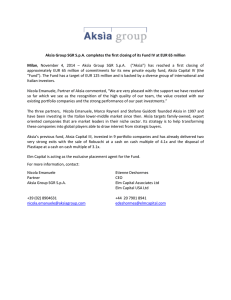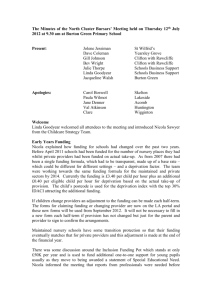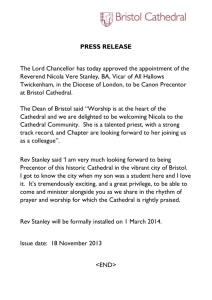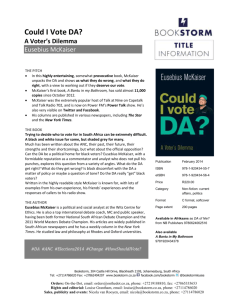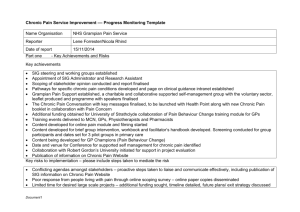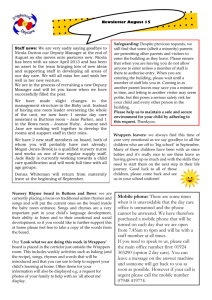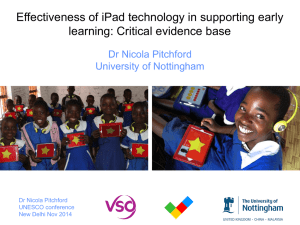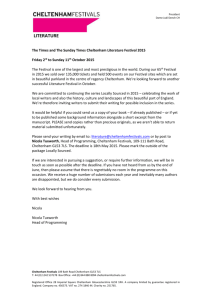NICOLA participant Information Sheet
advertisement
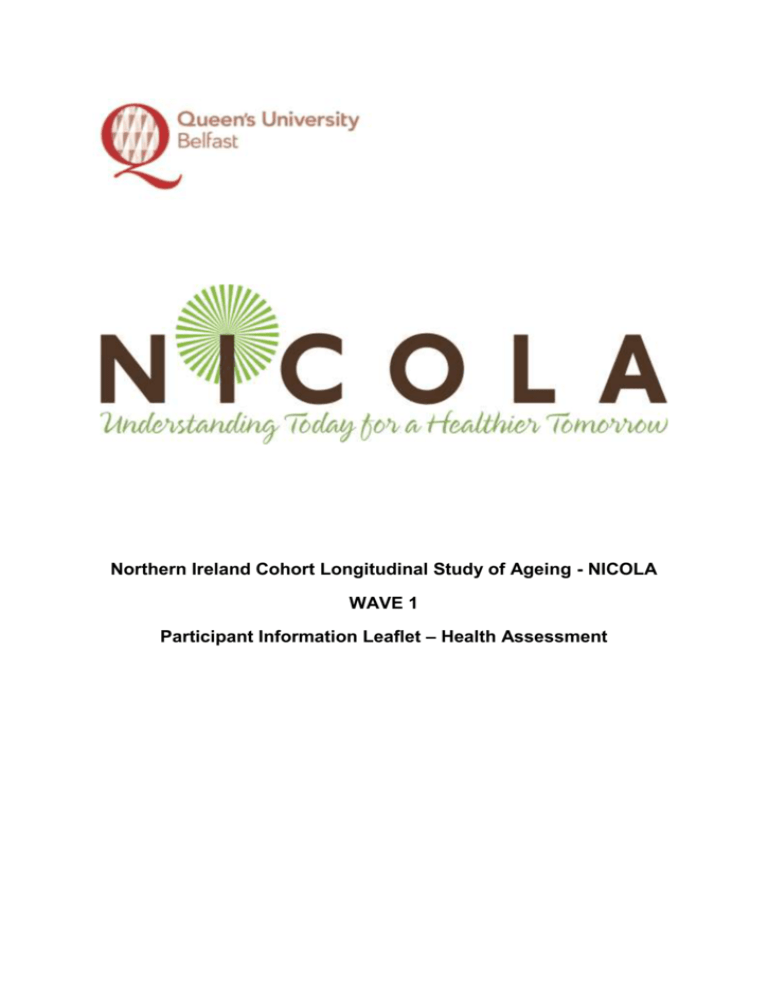
Northern Ireland Cohort Longitudinal Study of Ageing - NICOLA WAVE 1 Participant Information Leaflet – Health Assessment Your invitation You are being invited to take part in a health assessment as part of the ‘NICOLA’ study. The purpose of NICOLA is to understand the health, lifestyle and financial situation of 8,500 people as they grow older in Northern Ireland, and to see how their circumstances change over time. Before you decide to take part in the health assessment, it is important for you to understand what is involved. Please take the time to read the following information carefully, and discuss it with others if you wish. If you have any questions, one of our NICOLA nurses will take you through the details of this information sheet either by telephone or face to face when you come for assessment. What is the purpose of NICOLA? NICOLA aims to study the health, social, personal wellbeing and financial circumstances of people’s lives as they enter into and beyond retirement in Northern Ireland. The study will cover a broad set of topics relevant to a full understanding of the ageing process. The results will then be compared to people in the United Kingdom and the Republic of Ireland. What are the stages of the NICOLA study? The NICOLA study consists of the following 3 stages: an interview, a questionnaire and a health assessment. You will remember that in the first stage you were interviewed in your own home. The interviewer collected information on living arrangements, children, education, income and assets, physical and mental health, employment, lifelong learning, planning for retirement, care and social support. In the second stage you were provided with a paper questionnaire to return to us in a prepaid envelope. The final stage of the NICOLA study is a health assessment. As a NICOLA study member you are invited to attend a detailed health assessment which will take place at our research facility based at the Belfast City Hospital. Why is the health assessment important? The population aged over 50 is the most rapidly growing group in Northern Ireland. On average, people are living longer and retiring earlier. From a scientific point of view, we do not know enough about how the health and financial resources of people are linked to the ageing experience. This health assessment will help medical and other health and social care professionals understand the experience and effects of ageing. Additionally, until now, there has not been enough good information to inform policy and planning for health and social care. By taking part in this study you will provide the answers needed to inform policy and planning both now and for future generations in Northern Ireland. What are the benefits of taking part in the health assessment? The biggest benefit of research is often not directly experienced by you, but is the increase in knowledge which benefits people in the future. For example, if you are currently receiving medical treatment it is likely that you are benefiting from research which has been carried out in the past. However, if you do consent to take part in the health assessment your health and general wellbeing will be assessed closely by specially trained, qualified nurses and monitored by medical researchers over the years of your involvement. With your permission, we will write to you after the assessment with some results if we feel you should discuss them with your GP. What happens DURING the health assessment? Your appointment at the assessment centre should take approximately 2 hours. A registered nurse will ask you questions and will ask permission to take measurements. The measurements are described below. You need not have any measurements taken if you do not wish but, of course, we very much hope you will agree to them as they are a very important part of the study. For the results to be useful to us, it is important that we obtain information from all types of people in all states of health. We guarantee to protect the confidentiality of all information and results from your health assessment. Blood pressure We will measure your blood pressure using an inflatable cuff that goes around the upper arm. High blood pressure can be a health problem. However, blood pressure is difficult to measure accurately. A person's blood pressure is influenced by age and can vary from day to day with emotion, meals, tobacco, alcohol, medication, temperature and pain. Although the nurse will tell you your blood pressure reading along with an indication of its meaning, no diagnosis can be made. We will write to you if we feel you need to talk to your GP about your blood pressure. Lung function We would like to measure the amount of air you can breathe out of your lungs and how quickly you can get it out. This involves blowing into a tube. The amount of air you are able to breathe out depends partly on your height, your age, and how fit you are. Thinking We will ask you to complete some tasks about memory and thinking. You will be given clear instructions and then be asked to answer some questions and complete some paper puzzles. If we detect that your thinking is significantly impaired we will write to you about this and ask you to speak to your GP about it. Physical measures We would like to assess your upper and lower body strength and your ability to balance. The upper body strength assessment involves gripping a handle which will provide a reading of grip strength. The lower body strength assessment is your ability to stand up from a firm chair without the use of your arms and walk for a short distance. Measuring your ability to balance involves asking you to perform a few simple movements such as tapping your feet on and off a step. Photograph We will take a photograph of you sitting in a chair. Some people believe that your life experience is reflected in your face, we would like to see if this is true by taking your picture and comparing it with other indictors of ageing. We hope to use the information you have provided to us to explore this. With your permission we will keep your photograph and see how your appearance changes in years to come as you get older. Height & weight Both the height and the weight of the population appear to have been changing very rapidly over the last two decades. These changes reflect the changes in the population's diet and lifestyle. We are interested in the relationship between general build and health. We will measure your height while you are standing, and also your weight. Waist-to-hip measurement Lately there has been much discussion about the relationship between weight and health. An important factor is thought to be the distribution of weight in the body. Your waist to hip measurement is most useful for assessing this. We will use a tape measure to measure your waist and hips. Fat and muscle measurements We would like to take a reading of your body muscle and fat using a small device we clip on to your finger and toe. Measuring your weight alone is not a reliable indicator of good health as this does not take into account body fat or muscle content i.e. a very fit and muscular person can be the same weight as a couch potato but their body fat and muscle content will be completely different. Eye examination As well as testing your vision, we will take pictures of the back of your eye to look for age related changes. We will perform the following assessments. 1. Eyesight: You will be asked to read an eye chart to see how well you can see under normal and reduced lighting conditions. In addition you will be asked to look at an image within a machine that calculates whether you are long sighted or short sighted. 2. Eye pressure: You will be asked to look at a target and you will feel a little puff of air on the front surface of your eye. The nurse will let you feel the air puff on your hand first so that you know what to expect. 3. Eye images: Photographs will be taken of the back of the eye using three different types of cameras. You will experience some bright flashes of lights just like the flash in an ordinary camera. Using eye drops to dilate your pupils (1 % Tropicamide) We would like to take photographs of your eyes using equipment which allows us to see into the back of the eye (retina) in a manner that will not hurt or damage your eyes. These pictures give us information on how healthy the eyes and blood circulation are and will help us to understand the earliest signs of eye disease even before sight becomes affected. When these images are reviewed by our researchers if we see anything that gives us concern we will contact you to arrange appropriate referral. In order to obtain high quality pictures of the eye we may ask if we can use an eye drop to enlarge the pupil of your eyes. You will be given the choice of having drops in: - Both eyes - One eye Or - Not to use eye drops in either eye. In order to obtain the best picture of your eyes, we would like to put eye drops in both eyes if possible. If you plan to drive after the session, then we will suggest putting eye drops in only one eye (i.e. the weaker or non-dominant eye). These drops may temporarily blur your eyesight and make your eye more sensitive to bright sunlight. The symptoms are very short lived and disappear after a couple of hours (usually within 2 to 4 hours). When the eye drops are put into the eye you may feel a sensation of stinging and this only lasts a few seconds. You should not drive or operate machinery until your sight returns to normal and your eyes feel comfortable. You may find it helpful to wear sunglasses if it is a very sunny day. If you are a car driver, before you drive: Check that you can read a car number plate from 20.5 metres (67ft) (approx. 5 car lengths) with glasses or contact lenses if normally worn (D.V.L.A. regulations). You can read your dashboard. Blood and urine samples This is an important part of the study, as the analysis of samples will tell us a lot about the health of the population. Medical tests of samples are becoming more advanced and specialised. This means that we may be able to learn more about the health of the population by re-testing blood in the future. With your permission your samples will be securely stored and kept for future analysis. Urine sample We will ask you to provide a small sample of urine. The nurse will provide you with a sample bottle. We only require a small amount of urine for the sample, around 10mls (two teaspoons). Blood sample We would be very grateful if you would also agree to provide us with a sample of blood. You are of course free to choose not to give a blood sample, and the nurse will ask for your permission before a blood sample is taken. Just over three tablespoons of blood (no more than 50ml) will be taken from your arm by a qualified nurse. The blood sample will be sent to a medical laboratory for testing of fats such as cholesterol in the blood, diabetes indicators, and a range of other tests relating to ageing and for DNA extraction. About cholesterol: Cholesterol is a type of fat present in the blood, related to diet. Too much cholesterol in the blood increases the risk of heart disease. If your cholesterol is too high we will write to you and advise you to discuss it with your GP. About DNA: As unique individuals we are influenced by our genes. We have genes that determine many things about us such as our height, hair and eye colour and also the likelihood that we may develop certain diseases. Genes are composed of DNA. DNA can be obtained from any cell in the body. Since we wish to take a blood sample anyway we would like to use this to prepare DNA. These samples will be assessed to find out how many people have a certain type of gene. In the future, if a certain gene is found to be associated with a certain illness, then knowing how common that gene is will help to plan and develop health care. We will not contact you about any results relating to your genes. This information will not be made available for life insurance, mortgage applications, police records or AIDS/HIV testing and will only be used for research. Names of individuals will never be revealed or identified in the presentation of the results. Each blood sample in the study will be given its own number. This number will be different to the number your home interview was given. Only this number, and not your name, will appear on the bloods, prepared DNA samples and the stored materials. The paperwork which links your name and details to your results will be kept on a secure computer at Queen's University Belfast. The nurse will ask for your permission for your samples to be used by future studies. If you consent to this your samples will be made available for future studies relating to health. These studies will have received full Ethics Committee approval. Where will the assessment take place? The assessments will take place in the Northern Ireland Clinical Research Facility. This is a dedicate research centre for Northern Ireland, opened in 2013. It is based in the tower block of the Belfast City Hospital. Further information and directions will be sent to you if you decide to come to the assessment. What should I do if I am willing to take part in the health assessment? Please contact the NICOLA office, using the contact details below to arrange a suitable date and time for the health assessment to take place. If we do not hear from you within one week, we will contact you to make this arrangement. What should I do if I do not want to take part? If you definitely do not want to take part in the health assessment please let us know. No offense will be taken if you decide not to take part. What can I do if I’m unsure about taking part? If this information leaflet does not answer all of your questions then please contact us on 02890 633078, all queries will be dealt with promptly and in strict confidence. Do I have to take part in the health assessment? No; it is entirely up to you to decide whether or not to take part in the health assessment. If you do decide to take part your consent will be recorded when you attend the assessment centre. Why do you need my written consent? Your participation in health assessment is entirely voluntary. By signing the consent form, you will be confirming your willingness to take part. Even if you do consent to participate, you will be free to withdraw at any time later if you wished to do so. Do I need to agree to everything in the health assessment? No. If you feel uncomfortable about answering certain questions or taking part in any of the assessment then you do not need to. Your contribution is important, even if you feel that you may only wish to take part in some, not all, of the assessment. The information we gather will help to build up a picture of your health and wellbeing and the overall picture of health in the over 50s in Northern Ireland. Are there any risks for me taking part in the health assessment? Very rarely, dilation of the pupil of the eye can result in an increase in the eye pressure. This only happens in people who are already at risk of developing this problem at some point in their lives. After your visit, if you experience severe pain or discomfort in your eyes, redness of the white part of your eyes, significant reduction of your sight with rainbow haloes around lights, nausea or vomiting (accompanying the eye pain) you should contact your GP or go to an accident and emergency department near you. There is a small risk of bruising or discomfort after the blood test. It is possible that you may be slightly uncomfortable with some of the questions or assessments. You may decline to take part in any stage of the assessment which you are not comfortable with. Participation involves a minimal risk in relation to the use of personal information. Great care will be taken to ensure the confidentiality of all data (see below) and the risk to participants of a breach of confidentiality is considered very low. Can I claim travel expenses? Yes; you can claim back any reasonable travel expenses for your attendance by completing a simple claim form after the assessment (include any receipts if necessary). Where personal or public transport is not available to you as a means of attendance, the NICOLA team will make your travel arrangements. Please contact us for advice. You may also claim your £10 for participation in the study at this point. What happens AFTER the interview visit and health assessment? With your permission, we will write to you after the assessment if we think there is anything you should speak to your GP about. If there is anything that concerns us following the review of the images of your eyes we will contact you about this separately. If you consent to us contacting you again, you may be invited by the NICOLA research team to answer more questions. You can choose if you wish to take part. Giving such additional help would be entirely optional. All of your personal information would be held by the NICOLA team in strict confidence with careful controls, and no identifiable information about participants will be available to anyone outside of NICOLA. Your samples may not be analysed immediately following collection. Instead, during follow-up, your stored samples will be analysed for approved research purposes. How will information about me be kept confidential? NICOLA has put a number of rigorous procedures in place to protect the confidentiality of participants. These include: Keeping information that might identify individuals (such as names and addresses) separate in NICOLA’s databases from other information. Computer security to block unauthorised access to the computers that hold personal information. Access to personal information is restricted and only accessible by a small number of the core NICOLA team who have a responsibility to keep your information confidential. Data provided to NICOLA researchers will not include personal identifying details. No data based on small geographic areas that might risk being identified with you or your household, will be made available to government bodies, councils, the press or members of the public. How will the study information be used? Information gathered during this study will be used to inform medical research and plan Northern Ireland Health and Social Care provision in the future. Researchers will also use the anonymised data to help understand important questions in health, economics and ageing. Their results will be used to advise on health and social care and other policy areas affecting the over 50s population in Northern Ireland and to compare us to similar studies in other countries. How do I withdraw if I want to do so? We aim to make NICOLA an enjoyable and valuable experience for everyone who chooses to take part. We aim to have as few people as possible deciding to withdraw from the study. We would encourage you to discuss any concerns you might have before agreeing to participate. You can withdraw at any time after given consent by contacting the NICOLA study office, or by speaking to the NICOLA nurses at your health assessment. This will also allow us to discuss your concerns and determine the desired level of withdrawal from the study. You will be asked to confirm your withdrawal in writing with your signature. The reason for your withdrawal will also be recorded. If you are unable to do so for some reason (such as illness) this can be done by someone acting on your behalf. What happens if something goes wrong? The risks of participants suffering harm as a result of taking part are minimal and NICOLA has insurance in place to provide compensation for any negligent harm caused by participation. Who do I contact if I have any concerns? We hope you have found this leaflet interesting and that it shows you the importance of the health assessment and your involvement. If you have any concerns or questions about anything to do with NICOLA then you can contact us directly. All queries will be responded to promptly. NICOLA – Health Assessment Centre for Public Health Queen’s University Belfast Institute of Clinical Sciences, Block B Grosvenor Road BELFAST BT12 6BJ Tel: 02890 633078 Email: NICOLA@qub.ac.uk Facebook: Nicola QUB You can find out more about the study at our web site www.nicola.qub.ac.uk
